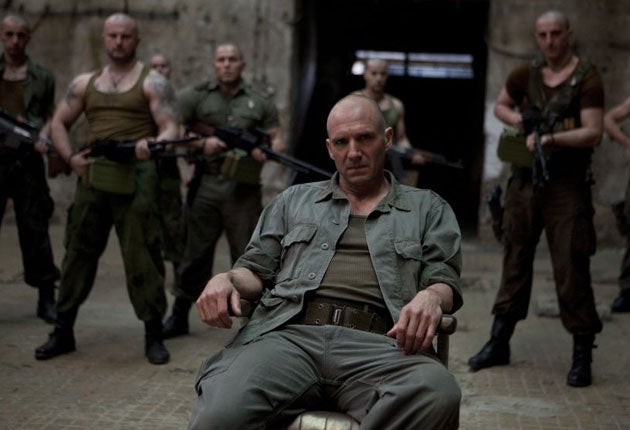Coriolanus, Berlin Film Festival
All's well with this action hero

Ralph Fiennes's Coriolanus is a bloody, testosterone-filled updating of Shakespeare's play, shot and performed with real vigour. This is the Bard done action-movie style.
Making his directorial debut, Fiennes (who also plays the lead) takes the bold decision to set the film in what appears to be the Balkans of the 1990s. The film begins with CNN-style footage of Fiennes in army fatigues engaged in street fighting in a bombed-out city. Soon, he comes face to face with his arch-enemy, the hirsute Aufidius (Gerard Butler), commander of the Volscian army. Utterly implausibly, the troops lay down their guns while the two commanders engage in single combat with knives.
Anachronisms abound. The scenes in which characters deliver long soliloquies in blank verse and then jump into tanks can be disconcerting. The riot scenes that invoke anti-globalisation protests and sequences of politicians running around in suits are likewise jarring as is the cameo from Channel 4 newsreader Jon Snow. However, Fiennes directs with such verve that the occasional discordant moments are never a problem. He is helped by Barry Ackroyd's wildly energetic camerawork and some redoubtable character performances. Vanessa Redgrave excels as Volumnia, the tough-as-flint mother of Coriolanus who takes pride in her son's bloody exploits. Brian Cox brings wisdom and fatalism to his role as Menenius.
After the stormy introduction, Coriolanus is plunged into the backstabbing world of "Roman" politics. He is far too abrasive a figure to thrive and soon ends up in exile, joining his former enemies the Volscians as they march on Rome.
Fiennes knows Coriolanus inside out. He played the role in a well-received stage version directed by Jonathan Kent a decade ago. His screenwriter John Logan helps turn Shakespeare's original text into a script with a hint of The Hurt Locker about it. This, too, is a film about men addicted to war. Fiennes and the other cast members deliver their lines with such conviction that we never question why they are speaking in blank verse. They don't seem embarrassed and so neither should audiences.
In the course of the film, Fiennes undergoes a number of transformations. Early on, he's the archetypal military man, marching around with his sleeves rolled up as if he is the Roman army's answer to General Petraeus. Then, when he goes into exile, he grows his hair long and turns into a backpacker. Finally, once he has thrown in his lot with Rome's enemies, he has his head shaved and becomes ever more psychopathic. Both in his own performance and in his role as director, Fiennes is going for intensity at all costs. There is no humour here. Nor are there any lighter scenes. The mood is deliberately very dark throughout.
It's questionable whether Fiennes and his team uncover anything new by reworking Coriolanus and setting it in the present day. What they do deliver is a rousing and primal drama – one of the few films likely to appeal to action fans and Shakespeare lovers in equal measure.
Join our commenting forum
Join thought-provoking conversations, follow other Independent readers and see their replies
Comments
Bookmark popover
Removed from bookmarks